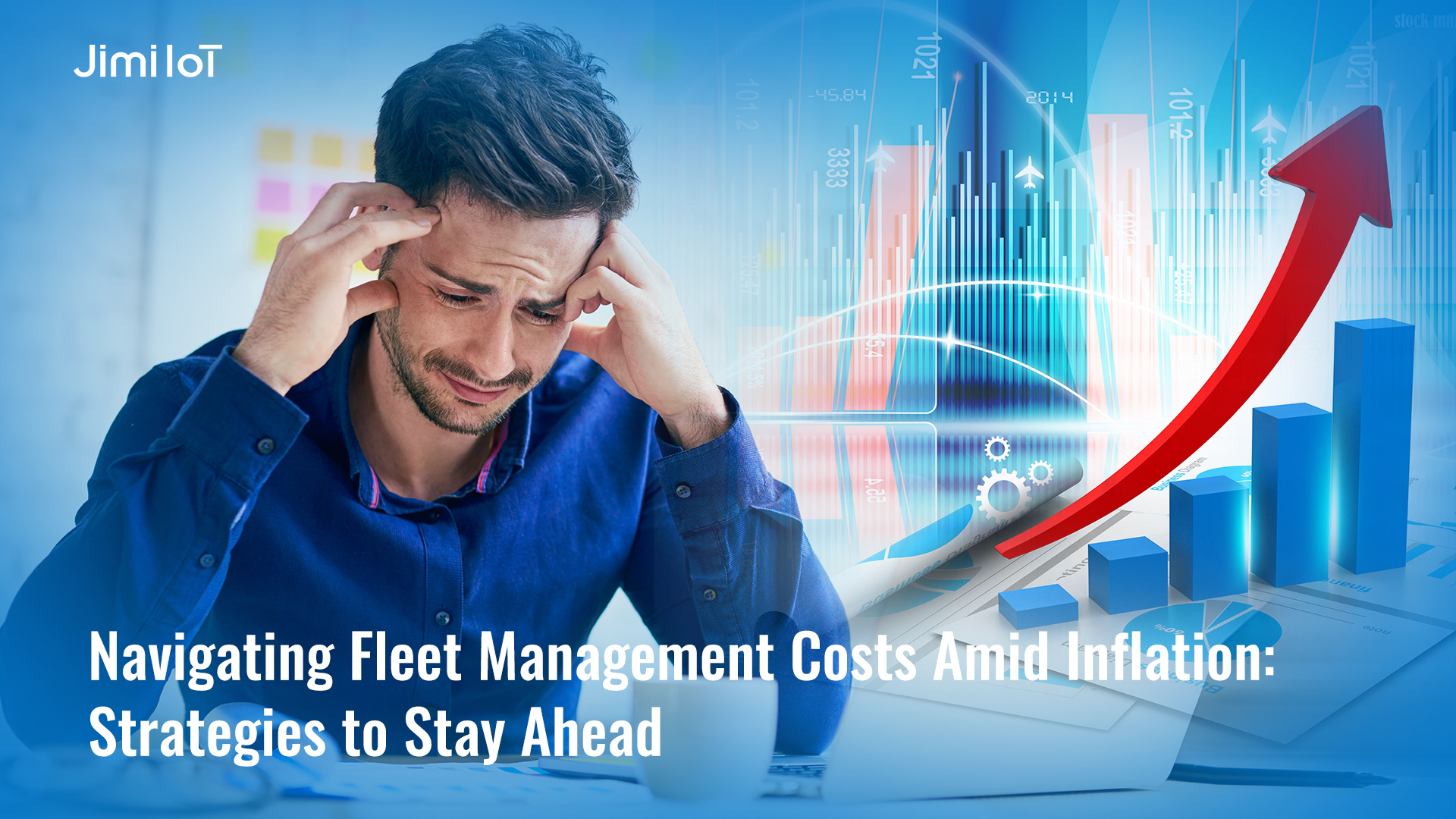Introduction
In today’s volatile economic environment, inflation presents a formidable challenge for businesses, particularly those managing logistics fleets. As expenses related to fuel, maintenance, and vehicle procurement rise, fleet managers must adopt strategic approaches to navigate these financial headwinds effectively.
This article delves into the various strategies fleet managers can implement to control costs amid inflation, with a particular emphasis on the role of advanced telematics and IoT solutions provided by Jimi IoT in ensuring efficiency and sustainability.

Comprehensive Cost Analysis
- Scrutinize Operating Expenses:Conducting a detailed review of operating costs is paramount. This includes fuel expenditures, maintenance and repair costs, insurance premiums, and administrative overheads. Identifying areas where expenses can be reduced without sacrificing operational efficiency is the first step in cost management.
- Assess Total Cost of Ownership (TCO):Evaluate the Total Cost of Ownership (TCO) for each vehicle in your fleet. Beyond the initial purchase price, consider long-term costs such as fuel consumption, maintenance, and depreciation. This analysis aids in making informed decisions about fleet expansion or downsizing.
Fuel Management Optimization
- Implement Fuel-Efficient Practices:Educate drivers on fuel-efficient driving techniques, including reducing idling time, maintaining optimal tire pressure, and planning efficient routes. Minor adjustments in driving behavior can yield significant fuel savings over time.
- Invest in Alternative Fuel Vehicles:Consider the integration of alternative fuel vehicles, such as electric or hybrid options, into your fleet. These vehicles can substantially reduce fuel costs and contribute to a more sustainable and environmentally responsible operation.
Proactive Maintenance Strategies
- Prioritize Preventive Maintenance:Regular maintenance is crucial for identifying potential issues before they escalate, reducing the risk of costly repairs and minimizing vehicle downtime. Establish a comprehensive maintenance schedule and adhere to it rigorously.
- Fleet Health Monitoring Systems:Invest in advanced fleet health monitoring systems, such as those provided by Jimi IoT. These systems offer real-time data on vehicle performance, enabling early detection of maintenance issues, preventing breakdowns, and extending the lifespan of your fleet.
Strategic Asset Utilization
- Optimize Fleet Size:Evaluate your fleet size to ensure it meets operational demands without unnecessary surplus. Right-sizing the fleet can minimize acquisition and maintenance costs.
- Implement Asset Sharing:Consider asset-sharing programs, particularly during off-peak seasons or when certain vehicles are underutilized. Sharing assets across different branches or operations can help distribute costs more effectively.
Data-Driven Decision Making
- Leverage Telematics Solutions:Utilize telematics solutions to gather and analyze data on vehicle performance, driver behavior, and fuel consumption patterns. Jimi IoT’s telematics systems provide valuable insights that can inform decisions on route optimization, vehicle allocation, and fuel management.
- Implement Cost-Effective Technology:Invest in cost-effective technology solutions such as GPS tracking, route planning software, and predictive analytics tools. These technologies streamline operations, reduce fuel consumption, and enhance overall fleet efficiency.
Negotiate Favorable Supplier Contracts
- Vendor and Supplier Management:Review and renegotiate existing contracts with fuel providers, maintenance vendors, and vehicle suppliers. Securing favorable terms, bulk discounts, and long-term agreements can mitigate the impact of rising costs and ensure stable pricing.
- Explore New Suppliers and Partnerships:Research alternative suppliers and service providers who may offer competitive pricing and value-added services. Building strong partnerships can lead to mutually beneficial cost-saving opportunities.
Driver Training and Accountability
- Training on Cost-Effective Driving Practices:Regularly train drivers on cost-effective driving practices, vehicle maintenance awareness, and fuel-efficient behaviors. Cultivate a culture of accountability and responsibility among drivers.
- Performance-Based Incentives:Implement performance-based incentives tied to fuel efficiency, vehicle maintenance, and adherence to cost-saving protocols. Rewarding drivers for responsible behavior can motivate them to actively contribute to cost-saving initiatives.
Adaptive Budget Planning
- Flexibility in Budget Allocation:Develop a flexible budget that accounts for potential fluctuations in fuel prices and operating costs. Create contingency plans to address sudden cost increases without compromising the business’s financial health.
- Long-Term Cost Forecasting:Use historical data and market trends to forecast long-term cost increases. Incorporating these forecasts into budget planning ensures that financial projections are realistic and sustainable.
Sustainable Growth Strategies
- Embrace Sustainable Practices:Integrate eco-friendly practices into your fleet management strategies. Initiatives such as vehicle electrification, renewable energy adoption, and carbon footprint reduction can lead to long-term cost savings and a positive environmental impact.
- Invest in Employee Development:Foster a culture of continuous learning and development among your workforce. Encourage employees to stay updated on industry trends, technological advancements, and cost-saving practices, empowering them to contribute effectively to the organization’s cost management efforts.
Continuous Monitoring and Adaptation
- Regular Performance Evaluation:Continuously monitor the performance of cost-saving initiatives and adjust strategies as needed. Regular assessments ensure the ongoing effectiveness of these measures in reducing overall fleet management costs.
- Industry Benchmarking:Compare your cost management strategies with industry benchmarks and best practices. Staying informed about emerging technologies and industry trends can further optimize your fleet management processes and reduce operational costs.
Conclusion
In an inflationary environment, effective fleet management demands a proactive approach that combines strategic cost analysis, data-driven decision-making, and a commitment to sustainable practices. By leveraging advanced telematics and IoT solutions, such as those offered by Jimi IoT, businesses can navigate the challenges of rising operational costs while fostering a culture of efficiency and long-term viability. With careful planning and adaptive measures, fleet managers can successfully steer their operations through economic uncertainties, positioning themselves for sustained success in a rapidly evolving market landscape.
Why JimiIoT
JimiIoT is a global leader in innovative IoT solutions. We provide cutting-edge hardware and software tailored to enhance efficiency and connectivity. Our range of products includes advanced GPS tracking devices, asset management solutions, smart vehicle dashcams, and telematics platforms. With a focus on technological excellence and customer satisfaction, we empower businesses to optimize operations and gain valuable insights from data-driven analytics. Trust JimiIoT to drive positive change and unlock growth opportunities in the digital age.
If you would like more details, please visit Facebook, LinkedIn, INS, and Twitter pages for further information.

 US
US ES
ES PT
PT TH
TH VN
VN JP
JP



